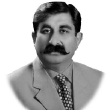Naveed Aman Khan
FAMOUS because of English literature laureate William Shakespeare, city of Stratford is surprisingly quite upon the river Avon. Visiting his birth place, funerary in Holy Trinity Church, school and classroom, his second home where he got shifted later on and created the best of the contemporary literature, his daughter Suasana and grand daughter residences and pub mesmerize the admirers of the legendary writer. Revered in his lifetime, Shakespeare received unmatched appreciation and acknowledgement with every passing moment. Renowned UK-based journalist Asif Saleem Mitha, Engineer Tariq Javaid Alam and Chaudhry Johar Siddique made my homage paying visit to Stratford memorable. In 1598, the cleric and author Francis Meres singled him out from a group of English playwrights as “the most excellent” in both comedy and tragedy. The authors of the Parnassus plays at St John’s College, Cambridge, numbered him with Chaucer, Gower and Spenser. In the First Folio, Ben Jonson called Shakespeare the “Soul of the age, the applause, delight, the wonder of our stage”, although he had remarked elsewhere that “Shakespeare wanted art”.
Between the Restoration of the monarchy in 1660 and the end of the 17th century, classical ideas were in vogue. As a result, critics of the time mostly rated Shakespeare below John Fletcher and Ben Jonson. Thomas Rymer, condemned Shakespeare for mixing the comic with the tragic. Nevertheless, poet and critic John Dryden rated Shakespeare highly, saying of Jonson, “I admire him, but I love Shakespeare”. For several decades, Rymer’s view held sway; but during the 18th century, critics began to respond to Shakespeare on his own terms and acclaim what they termed his natural genius. A series of scholarly editions of his work, notably those of Samuel Johnson in 1765 and Edmond Malone in 1790, added to his growing reputation. By 1800, he was firmly enshrined as the national poet. In the 18th and 19th centuries, his reputation also spread far and wide. Among those who championed him were the writers Voltaire, Goethe, Stendhal and Victor Hugo.
Shakespeare’s works include the 36 plays printed in the First Folio of 1623, listed according to their folio classification as comedies, histories, and tragedies. Two plays not included in the First Folio, The Two Noble Kinsmen and Pericles, Prince of Tyre, are now accepted as part of the canon, with today’s scholars agreeing that Shakespeare made a major contribution to the writing of both. No Shakespearean poems were included in the First Folio. In the late 19th century, Edward Dowden classified four of the late comedies as romances, and though many scholars prefer to call them tragicomedies, Dowden’s term is often used. In 1896, Frederick S Boas coined the term “problem plays” to describe four plays: All’s Well That Ends Well, Measure for Measure, Troilus and Cressida and Hamlet. “Dramas as singular in theme and temper cannot be strictly called comedies or tragedies”, he wrote. “We may, therefore, borrow a convenient phrase from the theatre of today and class them together as Shakespeare’s problem plays.”
Around 230 years after Shakespeare’s death, doubts began to be expressed about the authorship of the works attributed to him. Proposed alternative candidates include Francis Bacon, Christopher Marlowe and Edward de Vere, 17th Earl of Oxford. Several “group theories” have also been proposed. Only a small minority of academics believe there is reason to question the traditional attribution, but interest in the subject, particularly the Oxfordian theory of Shakespeare authorship, continues into the 21st century. Shakespeare conformed to the official state religion, but his private views on religion have been the subject of debate. Shakespeare’s will uses a Protestant formula, and he was a confirmed member of the Church of England, where he was married, his children were baptised and where he is buried. Some scholars claim that members of Shakespeare’s family were Catholics, at a time when practising Catholicism in England was against the law. Shakespeare’s mother, Mary Arden, certainly came from a pious Catholic family. The strongest evidence might be a Catholic statement of faith signed by his father, John Shakespeare, found in 1757 in the rafters of his bath place on Henley Street, Stratford. However, the document is now lost and scholars differ as to its authenticity.
Other authors argue that there is a lack of evidence about Shakespeare’s religious beliefs. Scholars find evidence both for and against Shakespeare’s Catholicism, Protestantism, or lack of belief in his plays, but the truth may be impossible to prove. The institutions like Oxford, Cambridge and Lincoln Inn have glittered hundreds of the intellectuals and leaders across the world. At the time of establishment of these exemplary institutions, the Indian subcontinent was busy in petty issues. If we have a bird eye view of the subcontinent we will not even find single university of European especially British level. West has gone far ahead and lead the world because of its love for knowledge. The governments here take care of the basic needs of their citizens including free dwelling treatment and education. I find people reading books and newspapers in trains, buses and parks. Elsewhere I travel in Great Britain I find people reading. In our country, Pakistan, governments are least bothered about the welfare of its masses. Education is a matter of no priority for our rulers. Resultantly, we are five hundred years behind spending slave-like life.
—The writer is book ambassador, columnist, political analyst and author of several books based in United Kingdom.










